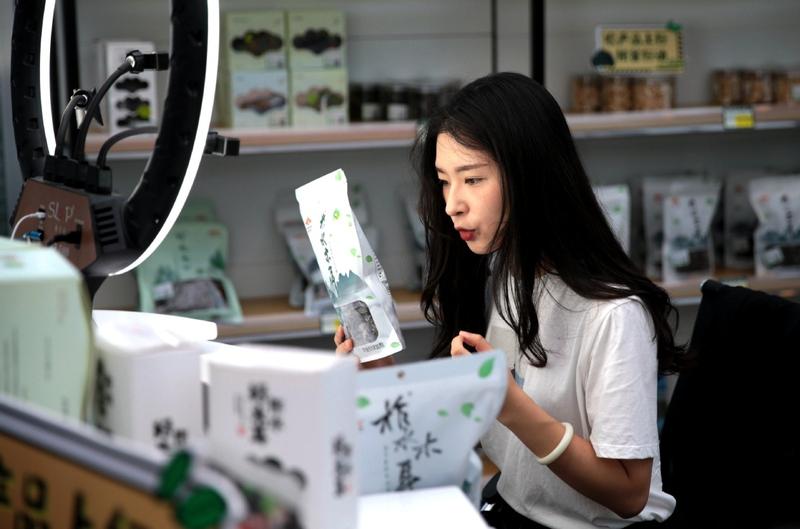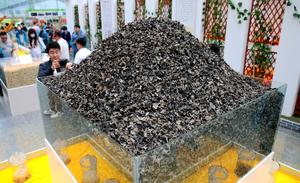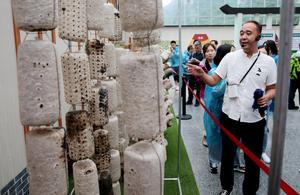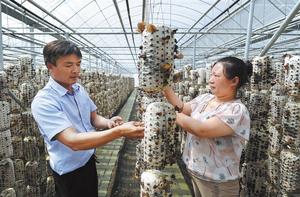The use of modern technology is raising incomes and helping impoverished families in a mountainous region. Xin Wen reports from Shangluo, Shaanxi.
 He Jinyi, a livestreaming saleswoman, discusses black fungus during an online broadcast at an exhibition center in Jinmi on July 21. (ZHANG YUAN / CHINA NEWS SERVICE)
He Jinyi, a livestreaming saleswoman, discusses black fungus during an online broadcast at an exhibition center in Jinmi on July 21. (ZHANG YUAN / CHINA NEWS SERVICE)
One May afternoon, shortly after He Jinyi started livestreaming and selling agricultural produce in Jinmi, a village in Zhashui county, Shaanxi province, a villager unexpectedly appeared in front of the camera.
Usually the farmers are too shy to show their faces, but this man was happy to be filmed as he worked, tending to the black fungus, an edible mushroom, he was cultivating.
What we have witnessed is that many consumers are unlikely to return to the traditional offline business model
Wang Mingqiang vicepresident of Alibaba Group and general manager of AliExpress, a cross-border online retail platform
Having started in spring last year, the use of livestreams to sell produce is still a novelty in the village, which is located in the region of the Qinling-Bashan mountains.
Walking around some greenhouses, He occasionally entered and used her phone and a holder to show the audience how the black fungus is cultivated.
"I feel very happy because it's great that the fungi growers have acknowledged the camera and gained a sense of livestreaming their products, which has boosted my confidence in joining the sector," the 26-year-old said.
In April last year, the law graduate from Northwest University of Political Science and Law in Xi'an, the provincial capital, joined the five-strong livestreaming team at Qinling Tianxia, an e-commerce company based in Zhashui, Shangluo city.
She joined the company, which sells the fungi, in 2016 when she graduated from college.
 Black fungus is on show in an exhibition room at the village on July 21. (ZHANG YUAN / CHINA NEWS SERVICE)
Black fungus is on show in an exhibition room at the village on July 21. (ZHANG YUAN / CHINA NEWS SERVICE)
Booming trend
In recent years, livestream sales have become big business, accompanied by the rise of several celebrity hosts who make millions every year selling products via outfits such as Taobao, China's biggest e-commerce sales platform.
Unlike traditional TV sales, livestreams are usually conducted via mobile phones.
The format allows hosts to engage with audiences in real time and gives viewers a chance to make requests or comment about the goods being sold, fostering a sense of participation.
Having started in 2015, China's livestreaming craze developed gradually from the eastern regions to the middle and west.
Many places nationwide, especially rural areas, began promoting and selling local produce, prompting young people like He to undergo training to sell agricultural goods via multiple platforms.
A report by the Forward Industry Research Institute in Shenzhen, Guangdong province, said the scale of China's livestreaming e-commerce market is expected to reach 961 billion yuan (US$139 billion) this year, a rise of 128 percent year-on-year. It also estimated that the number of livestream users will reach 550 million by the end of December.
Livestream sales platforms have provided new opportunities for a number of poverty-stricken areas, driving local economic development in new ways.
 A guide displays black fungus to visitors at a greenhouse in Jinmi village, Zhashui county, Shaanxi province, on July 21. (ZHANG YUAN / CHINA NEWS SERVICE)
A guide displays black fungus to visitors at a greenhouse in Jinmi village, Zhashui county, Shaanxi province, on July 21. (ZHANG YUAN / CHINA NEWS SERVICE)
Becoming richer
In recent years, Jinmi has shaken off poverty by developing an industry based on black fungus.
By the end of last year, 549 of the 553 residents had been lifted out of poverty, accounting for 187 of the 188 households, according to local authorities.
Chen Qinghai, a 44-year-old resident, was once mired in poverty. Before the fungi industry was established, he worked part time in nearby mines, earning less than 20,000 yuan a year.
"Two years ago, when my wife was in poor health, some cadres from our village called to offer me the opportunity to plant black fungus," he said.
Chen left the mines and returned to the village early last year to build a greenhouse to grow the fungi.
He used 50,000 mushroom bags to grow black fungus, earning 30 yuan per 500 grams via offline sales.
However, once he started selling his produce via livestreams, his income soared.
"In the first half of this year, I earned more than 30,000 yuan by planting fungi. That's much more than I made in a year working at the mine," he said.
The father of three said his big wish is to buy a car and take his family for a drive.
In 2016, he and his family left their house deep in the Qinling Mountains and moved into a newly built house in the village.
The following year, the household was lifted out of poverty.
Lai Shengtao, first secretary of poverty alleviation in Jinmi, said the humid climate in the mountainous area had provided many job opportunities for village residents and attracted a number of talented people.
Jinmi has the perfect conditions for the cultivation of fungi, which thrive on dampness and humidity, according to Lai.
"An industry chain was formed around the planting of black fungus, which allowed many villagers to find jobs that suited them and doubled their incomes," he said.
"What we do, mostly, is have a lot of villagers planting fungi in their own greenhouses. After they harvest the mushrooms, companies take over and sell the produce either online or offline."
He added that the villagers are not required to spend their own money on spore bags and other equipment. Instead, local agricultural cooperatives undertake preparation of the raw materials.
"Otherwise, the villagers would have to manage and maintain the whole process of planting the fungi and then harvesting it when the time came," he said.
The industry has brought considerable benefits to the villagers, as each year around 3 million spore bags produce 150 metric tons of black fungus.
"In the future, I hope more people from different sectors will join this industry chain to make the fungi our magic wand to eradicate poverty," Lai said.
 Jinmi residents pick mushrooms in greenhouses on May 26. (ZHAO BIN / FOR CHINA DAILY)
Jinmi residents pick mushrooms in greenhouses on May 26. (ZHAO BIN / FOR CHINA DAILY)
New impetus
The introduction of livestream sales of agricultural produce has given new impetus to the development of Jinmi, which will provide more opportunities for the produce to go global.
Zhao Shaokang, CEO of Qinling Tianxia, said the company has earned 6 million yuan from livestream sales of black fungus since the start of the year.
The livestreams allow vendors to amass about 300 orders a day, amounting to 6,000 yuan to 8,000 yuan, and fungi and related produce can be sold nationwide.
"The goal of our livestreaming sales is to see more of our produce sold in countries participating in the Belt and Road Initiative in the near future," Zhao said.
'Shoppertainment'
When measures to contain the novel coronavirus were imposed nationwide, they became a catalyst for people to move their shopping habits online.
Wang Mingqiang, vice-president of Alibaba Group and general manager of AliExpress, a cross-border online retail platform, said part of the shift has seen people's consumption habits change as e-commerce boomed and livestreaming became more popular, tapping into new sales channels.
"This 'shoppertainment' has reshaped the entire business landscape, in addition to changing consumers' online shopping habits," he said.
He added that livestreaming has become an important channel in China for the creation of new employment opportunities and raising people's incomes.
"More interestingly, what we have witnessed is that many consumers are unlikely to return to the traditional offline business model once they get used to online shopping," Wang said.
"Some overseas consumers, even those who had their first contact with e-commerce during the pandemic, quickly changed their habits and bought household supplies and protective equipment online in the months that followed."
Worldwide, the pandemic has accelerated the shift to online activities, driving the development of the e-commerce market in a positive direction, he added.
The right choice
Back in Jinmi, He, the saleswoman, has often wondered whether she made the right choice in leaving her legal career and becoming a livestreamer.
"I always thought that an online livestreaming salesperson was an internet celebrity, someone required to sing or dance in front of the camera. In my mind, all online anchors were like that," she said.
"But after training, I found that everything and each platform is worth a try," she added.
"When I'm livestreaming, I can decide how to do the broadcast. More often than not, I chat with customers about topics ranging from the agricultural industry to my work and even my daily life.
"Within three or four hours, in addition to selling produce online, I share my insights with the audience. It feels great to resonate with them."
Zhao Xinying contributed to this story.
Contact the writer at xinwen@chinadaily.com.cn


